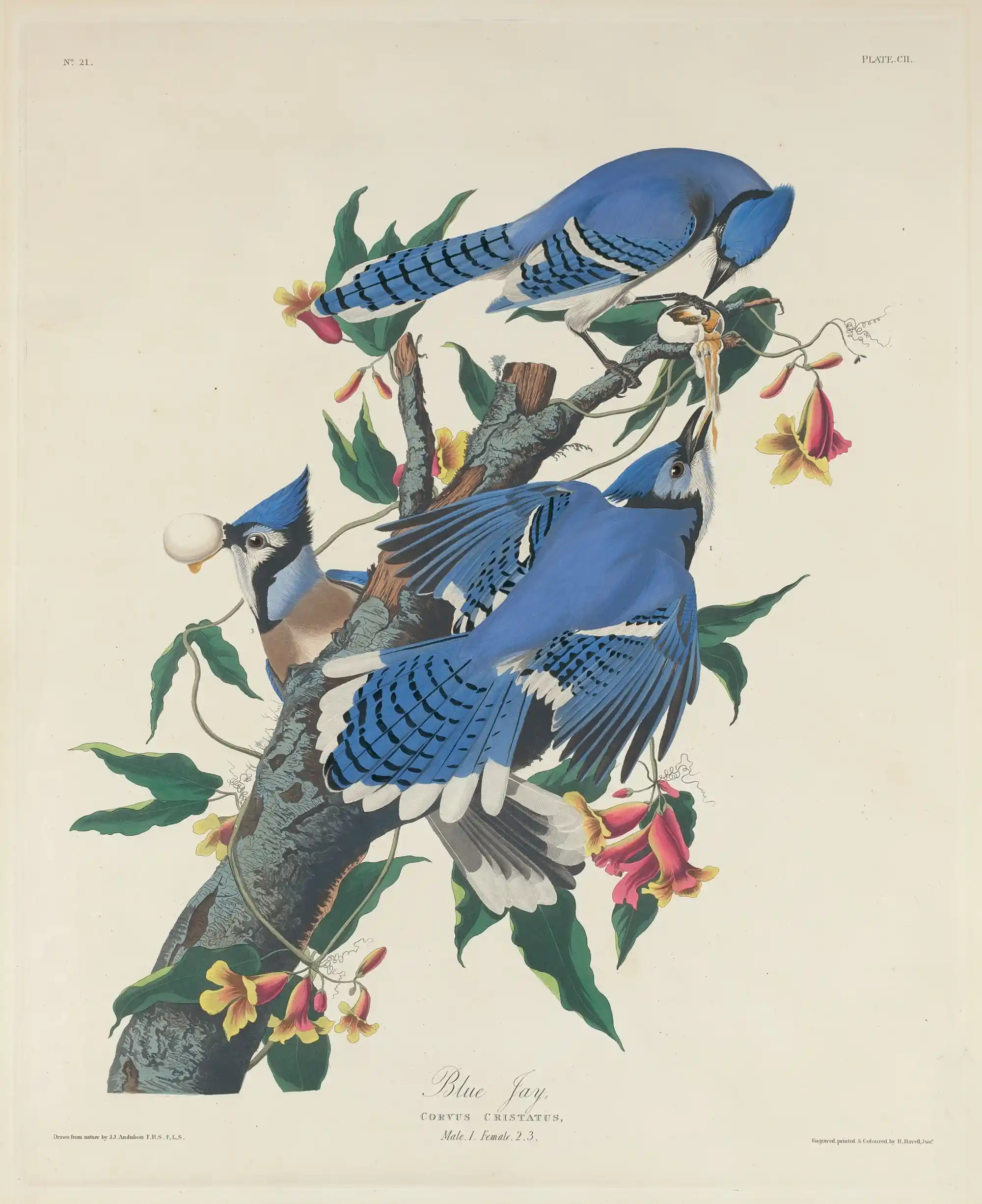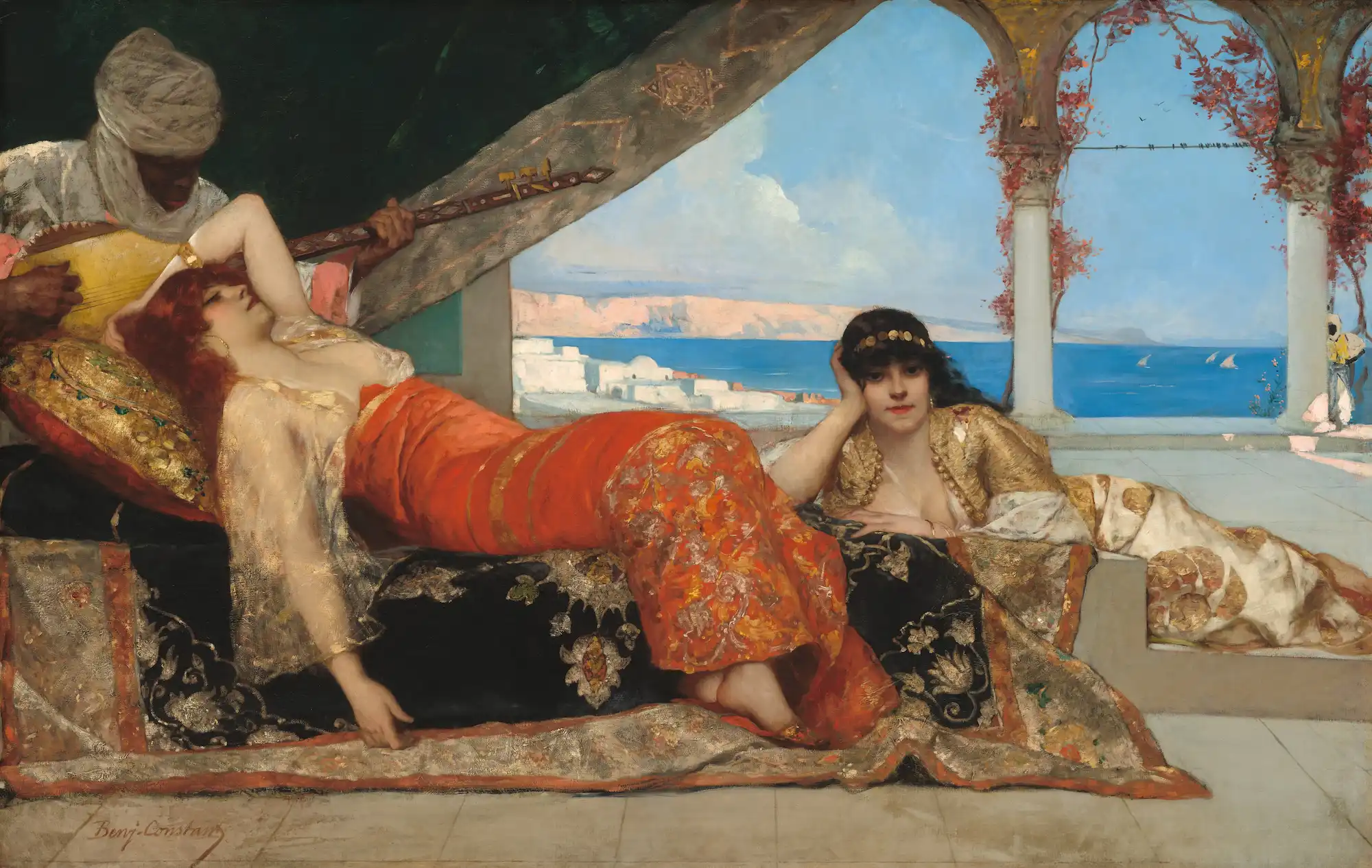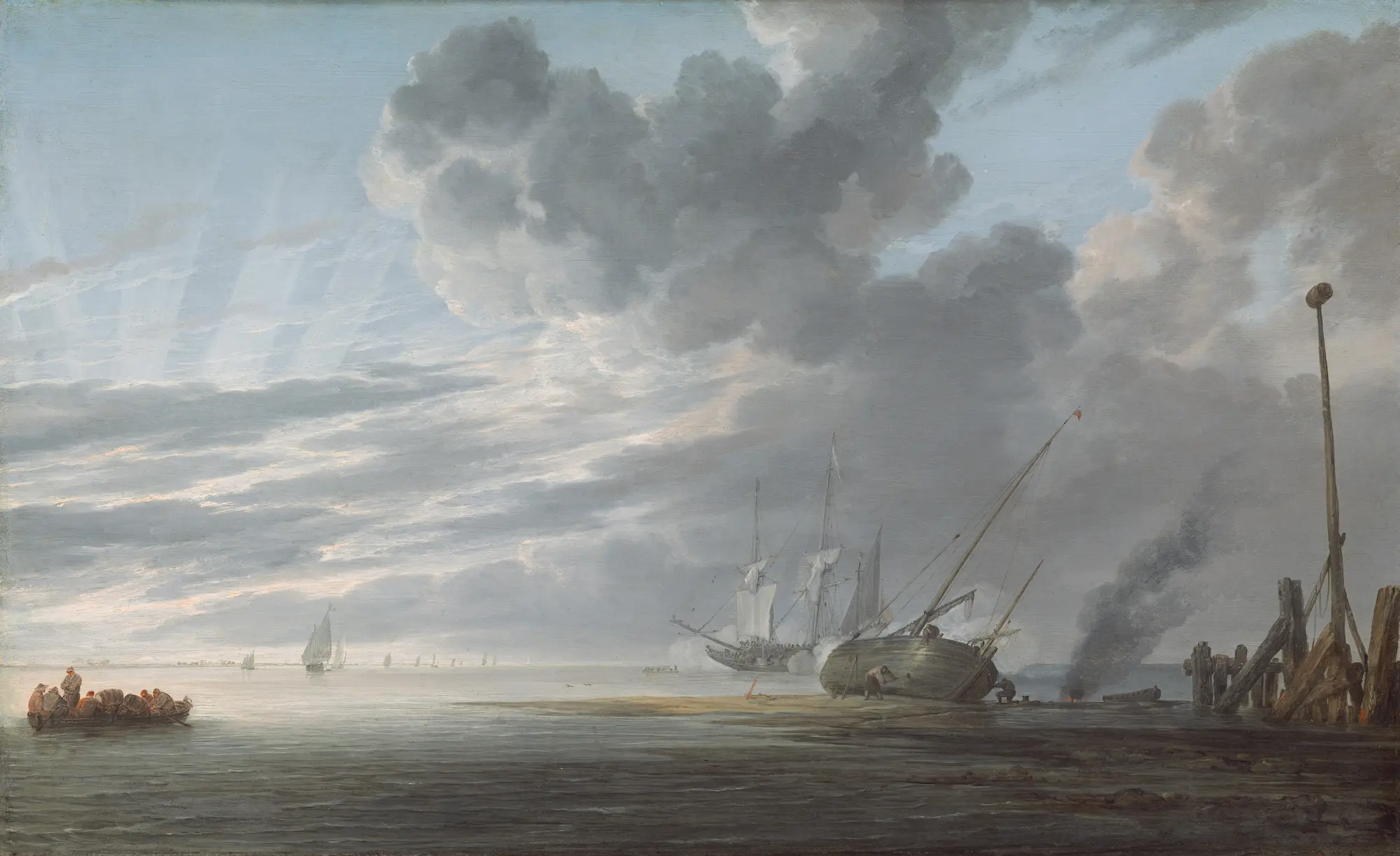
Blue Jay, by Robert Havell after John James Audubon
Missing Letter to Albrecht
Barbara† Johannes† Albrecht Sebald† Hieronymous† Anton† Agnes† Margarete† Ursula† Hans† Agnes† Peter† Katharina† Endres Sebald† Christina† Hans Karl†
The smoke tasted on my tongue that morning, mingled with fresh bite of air. Once on my tongue, the sapidity of ashing wood exhaled from my breath and nostrils. Clear, oh so clear. I was a young man then and my limbs made use, made use. I did not know yet, Albrecht, that you were already in Alsace, along the road.
The silver birches tore ripples of paper from themselves. My shoes made firm noise. Amongst small twigs: scratchings, and minute startling revelations. I shivered into the warmly emanated animal scents of my winter clothing as I waited. Not for you, then. For the flight of the blue pearl cross. Do you know what I mean? The German word for the blue-winged fisher remains eisvogel. Whether that is a bird of iron or ice is by its etymology indefinite. There is also the bird’s Latin name: halcyon, though you would prefer the vernacular. A Netherlandish man named Jannes who had lodged with us the year prior to your arrival told me halcyons (ijsvogels to him, almost identical to the German) were of use for the following: indoors they would turn, with stilled body strung from above, in the direction of the outwardly wind. I thought it seemed a cruel waste of that blue arrest, the shock and chest’s draw of its downswept flight, even then.
Your own name, it was yet to be fledged and truly traversed. Your father had never even intended you to be ‘Dürer’ at all, but ‘Türer’, a direct translation of his Hungarian surname which German pronunciation chose to ignore. But I saw the halcyon on that morning, Albrecht, as I would tell you later when you were talking about swan feathers, and our native storks. You arrived in the black steeping of evening, wearied and at first a little sullen, but were soon drawn into an easeful charm. You ate with appreciative acclamation the contents of the wooden bowl set before you. It comforted and sated you, the familiar presence of sauerkraut and richly stewed meat, savoury umber fats. Our proximal countries. I spoke some German—my mother, from Öttingen—so I was sent over first by Guerin to consult with you about our rooms, ascertain your length of stay and more surreptitiously, your means. I talked with you at your table. I gathered that you were only passing through (everyone passed through, even I in the end) and that your intentions were for Colmar, Basel, Strassburg. Your Wanderjahre, you explained. You were in your second year, and had lately been in the Netherlands. You had no beard at that time, but your hair was already growing long; the waves were looser and wilder, you had not yet made artful consideration of helices or hair oil. Shadow undercut the hesitancy of wick-light as you enquired—proficient conversationalist—where my German came from (you noted the layering of my accent, as I resided here in Alsace) and laughed that yes, you had heard of Öttingen, though perhaps not so many had.
Retrieved from a satchel you insisted on showing me your sketchbook, and how you would scratch into white lead with a silverpoint. There was a drawing in there of a dove that I could imagine twitching its head or wing, and nudging against my thumb. My mind turned by such skill in my own contemporary, I told you about the eisvogel, how I knew where to wait for it by the pool the river joined. Your enthusiasm urged and then affirmed an outing the next morning, for you had not seen one in all your—then slight—days. A remiss act of nature, for the sky not to deliver that lustre of blue to your eye and hand, and well you knew it. I saw a flash of greed pass over your eyes then, the honing of a wing, before it was smoothed by a resettling of benevolent spirits. We arranged you a room with linen pillows, bedsheets and one tallow candle, and you slept, you told us pleasantly, very well.
The new morning was a frost chime, and clarity rung the land. We were young men then, Albrecht. Our limbs made use, made use. Our sinews and our conversation were supple, and the sky existed to refresh us. You would be moving from workshop to workshop, you said, submitting yourself to instruction or at least the deferential appearance of submission. The first apprenticeship back at home in Nuremberg had been a success, it was a matter of following through, grasping the thing. You couldn’t stop moving, couldn’t stop the pulse of flight. You would scatter the compactness of your monogram over the cities and the hills, from the mills to the castles, and the shell of that black seed would split anew for each. Genius tracing roots through soil, or hatching over and over from eggshell. You were so invigorated by the travel, but it would be paused briefly after you married. Could you have yet had a shade of the knowledge you would be summoned to marry the daughter of the Frey house? You would submit dutifully, faithful son to Albrecht the Elder. You were one of the three survivors to the fifteen lost. There exists from this time the solemn early portrait of yourself delicately holding a blue eryngium: already, your blue thorns. Beside one pen-and-ink sketch, thought to be a preparation for the aforementioned portrait, is another contemporaneous sketch where your head is sunk morosely against your hand. No; the particular woman had not just yet formed from the charcoal’s smoke. But you knew the obligation of wedding, to open your own workshop in due course. The eyes, even on that walk, were sometimes translucent and sober, understanding the necessity of future steps.
By the gentle motion of the river we waited. Its flow was almost green, with the ice-touch of blue. I wonder how many saw you in a patient moment, you who were always travelling to the next thing. You were patient enough on this occasion for your fingers to go numb. The deliverance of iridescent blue which I had promised, it did not come.
On the return walk, by the transfixion of a bare tree, you looked around in survey and then pressed our jaws, chins, mouths into a meeting. You withdrew nearly as quickly as you had begun. I did not even get to feel the soft animal felt of your hair.
That was just a small bird, you said, airy and amused, but also, I think, a little scared.
We did not talk for some time, walking back the way we came. My eyes as they roved bark, chipped wood, white-toothed gnawing of frost, began to focus on the vivid clearness of forms, their precision of detail, searching for something they had not before. I wondered at this transference. Was this the liquid that drove your hand?
Once we arrived back, you parted from me politely, disappeared upstairs into privacy and packed your things. A late morning’s sustenance of thick and dense rye bread, very dark, with wedged cheese and heavy ale, might have sufficed your appetite; yet our cook Ysabelet sought to impress you, and made you a small plate in addition to these of what you would call krapfen, fried shapes of dough cooked in lard. You thanked Ysabelet thoroughly and made her quiver with mirth, then asked Guerin via my tongue—more than half-serious, though with warmth in your mouth—whether he would consider taking your drawing of the dove towards payment. Guerin did not accept your offer, though it might have reassured your vanity to know his sight was poor, for he suffered from cataracts. Alas, are you quite sure? It will be worth a pretty angelot one day, I promise you! You relented, and passed over your coins. For me, you reserved a farewell and a smile at the door, the leather band of your satchel slung over your brown journeyman’s coat.
The evening felt quiet and ponderous. A muted presence covered us. I tried a piece of charcoal, fetched by my hand from the charred remnants of kindling, against a scrap of parchment, after I had retired for the night. I did not have your aptitude; it goes without being said. I had smudges and fingerprints of charcoal left upon my body, after I had thought of you.
My fingerprints fanned a wing of smoke.
My work demanded earliness the next day. I did not get to walk. The day hence I stole some time around midday, taking the same track again that we had, Albrecht. Midway ahead, bedded on mud and a disassembly of twigs, I saw something piercingly blue. Dread took my feet as I came to the frail body of the bird, on its side in the dirt. With my hands I picked up the small cyanic saint. The trespass of closeness: I could see the fine incisions of the feathers, the sheen in the cold light. The clarity of my vision scratched itself upon my retinas. Arms aching, I took the body back with me.
I showed Guerin. I showed Ysabelet. I showed a woman hunched in the corner, wearing a hood of oily grey cloth and with knuckles like knobs. Ysabelet shrieked that there was a small white worm in its eye; Guerin instructed it would be best to dispose of the thing, he did not have the patience for his staff to make an unclean attempt at preservation.
My first thought was to write to you. I inscribed on the folded paper, ‘Albrecht Dürer—Colmar’. It was all I had, no forwarding address. I tried, at later intervals judged to be well-timed, ‘Basel’ and ‘Strassburg’. By the occasion of the last letter, I realised I was writing to myself only on the paper of absence. I had tried to sketch the halcyon in my room on that initial night after its retrieval, but there was no way to make the colour which was its foremost claim, and my line besides was inadequate. I could not give it the icon you would have. I focused my sight on its body, hoping in the delirious strain past midnight that, against all likelihood, it might bloom into a blue phoenix.
At last I had to act. The bird was fading. The disintegration of all things is pitiless. You, with more effort than you let on, managed the unlikely thing: integration into futurity. I saw them selling your prints once in Cologne, as I walked across smoothened stones to St Ursula. I never knew you wrote in your journal of visiting the same church. I did not read your occasionally crude, sometimes even unlikeable letters to friends (the whores and sacred women, they all ask after Albrecht, you teased grinningly in ink); your recorded purchases of pine nuts, braided straps for your shoes, an ivory comb for your long hair; of the bestowing of your black fur coat; the exchanged New Year’s wishes; your magnetic comments on memorably hübscher men; how at Antwerp, in the dark, they lit your inebriated passage home with lanterns. How once you passed a drowned village going to Arnemuiden in a boat, only the roofs cresting the water. How you advised the nunnery at Gnadenberg to prepare for heft of snow. All the angel-coins you cashed in—so many. I never got to read the contemplative verses you wrote for Christ, either: your friends all mocked you for your verse—it was decidedly mediocre—but you meant the lines you reserved for him, as you meant the many sketches of his face, the draughted ghost of your own. He never stopped subtly reformulating his aspect: you could only observe him as the white shadow thrown around the corner of your devotion. Never truly possessed. The mirror haunted you with its unfathomable similarity, the distance of Heaven in a width of glass. I never got to see your representations of the blue roller, also. But it wasn’t an eisvogel, was it? Was my metallic blue bird one other object that did, after all the accumulation, elude the fixing definition of your fingers?
Time elided me utterly. I feel this freely: my wishes were wings of a transient wind.
Before I buried the halcyon, I took with great sensitivity and care from its body five feathers. I pulled a piece of blank cloth over a small square frame tied from peeled twigs. I cut the soft blue into little squares and stuck these in geometric regularity onto the cloth using unguent wax. I hung the icon on the wall beside my bed, where panels of crushed blue pearl caught the light’s passing of my days.
—Anon., Alsace.
August 23, 2024
Further considerations

Telling the Truth
I once told a therapist my father was molesting me. It wasn’t true. I was twenty-five and exhausted, lying awake most nights trying to understand why I felt so sad when nothing in my life was obviously wrong.

Thoughts of Endangered Paper
Here I am, looking at this copy of a // two hundred-dollar book.

this is about capitalism, and The Poet Sees Her Ex at Pride
duty pulled a mountain along lesser used roads. // time was ill-spent preparing workers for the crossing.
.jpg?alt=media&token=3b6b38c2-6a33-462e-a707-5089fd5a25bd)
good people on both sides, and running fingers through your hair, thin as feathers
My dear trees, I no longer recognize you // The storm puts its mouth to the house